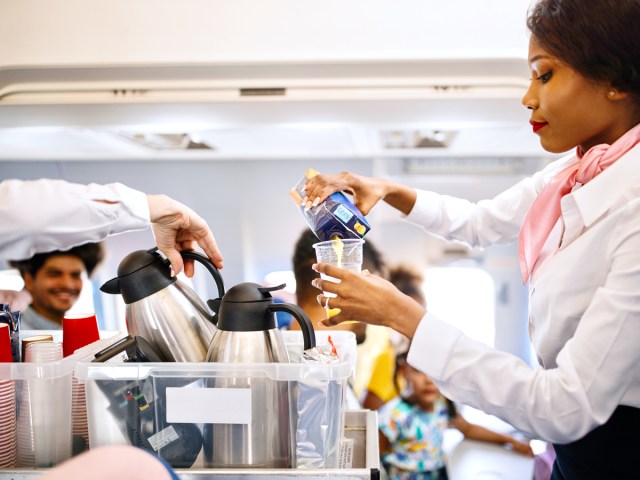Tipping culture is more confusing than ever these days, with seemingly every cash register in America equipped with the ability to suggest gratuity for every possible exchange. And that’s just at sea level, where about one-third of Americans believe the practice has gotten out of control. While other countries seem to have it figured out — in some, like Japan, tipping is not only not expected but considered disrespectful — here in the U.S., tipping etiquette seems to be ever-evolving. If you’re a frequent flyer, you might even be wondering whether you can, or should, tip your flight attendant. Here’s what experts have to say.
Is Tipping a Thing at 30,000 Feet?

For those weary of tipping culture in North America, the good news is that tipping is extremely uncommon at cruising altitude — though you might see a passenger try it in first class from time to time. Many airlines even have specific policies that forbid flight attendants from accepting tips.
For example, American Airlines allows “promotional items, complimentary tickets, or perishable gifts (candy, fruit, etc.)” so long as their value doesn’t exceed $100, but “cash, gift cards, and gift certificates” are not allowed under any circumstances, according to aviation blog View From the Wing. In the case of the former, crew members who receive such items as gifts from passengers are encouraged to share them with colleagues “when practical.”
United Airlines officially doesn’t allow tips, according to a report from MarketWatch, while Southwest strongly discourages them — but does allow flight attendants to accept them “if a customer were to insist.”
“It was considered inappropriate and undignified and most airlines forbade tipping or soliciting tipping, although of course it did happen now and then,” George Hobica, founder of Airfarewatchdog.com, told CNBC in 2019. “Most cabin crew would far prefer that a passenger write a letter of commendation to the airline to reward excellent service.”
Safety vs. Service

The biggest reason why some consider tipping flight attendants inappropriate is because it confuses their primary role. While passengers mostly interact with flight attendants when being served food and drinks, the crew members’ main responsibility is safety, not service.
Passengers tend to perk up when it’s time to get their pretzels and drinks, but the safety demonstration many of us ignore is a much more important part of a flight attendant’s job. If tipping were to become the norm on planes, it could change the dynamic between passengers and flight attendants and incentivize behavior that distracts from their primary duties, according to industry leaders.
Frontier Airlines made waves in 2019 when it began soliciting tips for cabin crew whenever in-flight food or drinks were purchased. Many passengers were unhappy with the development, as was the Association of Flight Attendants (AFA), which represents 50,000 flight attendants across 20 airlines.
“Flight Attendants are certified for our safety, health, and security work,” AFA president Sara Nelson wrote in a statement. “Safety is not variable and therefore base compensation for a safety job cannot be variable.” That, of course, is an issue with tipping across the board: having customers subsidize low wages.
“Over AFA objections when the function went onboard nearly three years ago, [Frontier’s] Management moved forward with a tipping option for passengers in hopes it would dissuade Flight Attendants from standing together for a fair contract — and in an effort to shift additional costs to passengers,” Nelson added in her statement. Tipping at 30,000 feet may be new, but the issues it brings up are decidedly old.
So far, Frontier remains the only major U.S. airline that explicitly allows flight attendants to accept gratuities. But if you’re flying another airline, that isn’t to say there’s no way to thank them for a job well done.
Frequent flyers on airlines such as American and Delta receive a set number of certificates each year, which they can award to employees for providing great service. Employees can exchange them for rewards. Many flight attendants also receive a commission when passengers sign up for their airlines’ credit card during a flight. If you feel like getting extra miles and helping out an especially helpful flight attendant, you might be able to do so using their referral code. Or, you can always submit a compliment on the airline’s website to recognize a flight attendant for providing outstanding service.
Featured image credit: kasto/ Adobe Stock
More from our network
Daily Passport is part of Inbox Studio, an email-first media company. *Indicates a third-party property.
















